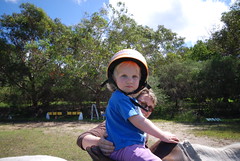The last few days have seen us eating a lot with old friends and old friends’ children. Moira, Richard and William have moved into a brilliant art deco house in Earlwood and are waiting for baby brother Francis Xavier to arrive any day now. Rachel, Michael and Patrick now have a wonderful open-plan kitchen and twelve-week-old Evelyn. (Claire loves Evelyn’s name because it has “evil” in it.) Anna, Bill, Tahlia and Luke have also extended, and we spent a morning on their shiny new verandah watching the weather roll in. Garfield, Olga, Madeleine and Sebastian bought the place they were renting on the edge of Garigal National Park. Wallabies and echidnas visit their garden.
Visiting every year or so as we do, we get these snapshots of peoples’ lives, flickering like a zoetrope: flats, weddings, babies, houses, second babies, renovations. It’s impossible (for me at least) to avoid wondering what life would have been like if we’d stayed. Would we have migrated up the North Shore or stuck to the Inner West? Would I have started the meds or stayed crazy-unhappy? Would I have kept working or stayed home with the kids or gone back to uni?
Does it matter?
My incipient midlife crisis seems to have broadened and deepened into a Buddhist meditation on death. Water is undermining the foundation of all these houses, of all the red-roofed California bungalows you fly over as your Qantas plane descends into Kingsford Smith Airport. All these cars on the road cough soot into the atmosphere, gently roasting the earth. Streetscapes change, friends while remaining absolutely identifiable as themselves grow ever older, the children I held when they were hours old are going into high school. And when you see forward like this you can see backward too, to when my mother had tiny kids like mine (and was, like Olga, stuck in a far northern suburb without a car), to when Jeremy’s father and his friend Joan were little schoolchildren themselves, in rural New South Wales. In the thirties.
And the only thing that seems to hold, the thread that sews these miraculous ordinary lives together, the serpent eating its own tail, is love. The friends I desperately want to see whenever I am in Australia are the people who were kind to me when I was a wobbly, pompous, witless mess through most of my teens and twenties (picture me sitting on the floor of Thussy’s farmhouse, remembering to breathe.) I’ve had a notably fortunate life but this undeserved compassion is probably its chief blessing.
Tomorrow I turn 37 and this is the first birthday since my 12th where I actually look my age; the baby belly and the crows-feet give me away. On Wednesday we fly back to San Francisco. Life in Sydney will go on, with its flat whites and adjustable rate mortgages, its wacky new prime minister, Tropfest and Tetsuya’s and the film festival, greedy developers and dreaming brick suburbs full of jacarandas and lemon-scented gums. I will pack my feelings back in their box and miss everyone here for another year.
My old categories no longer fit. I fled Sydney because it was a certain way, and San Francisco was another way; those reasons seem partial and suspect to me now, a glib confabulation. You might just as well say that because my mother and Jeremy’s mother migrated to have their children, it made sense to us to do it as well. Or tell the story I told Claire the other night; that a wicked fairy broke my heart in two pieces, and left one piece in Newgrange in Ireland’s County Meath, and the other on Bernal Hill. Narrative, as Joan Didion pointed out, is sentimental. It posits beginnings and endings where none are.
I can’t say anything about Sydney any more, except that it’s a mystery to me, as vast and unknowable as London or Claire, its twisty-turny road map like an MRI cross-section of a brain. (Oh, and that its inhabitants are apparently mole rats, since all our playdates now involve taking toll roads through billion-dollar tunnels.) I seem to have forgiven the city for the chunks I thought it tore out of me. But that relinquished anger leaves another kind of melancholy in its place. There are none more dead than those no longer mourned.
Who knows, maybe if I live another sixty years I’ll get around to forgiving myself.
The Germans have a word (of course they do) for this work of coming to terms with the past: Vergangenheitsbewältigung. It’s a measure of my state of mind that the German is more succinct.


